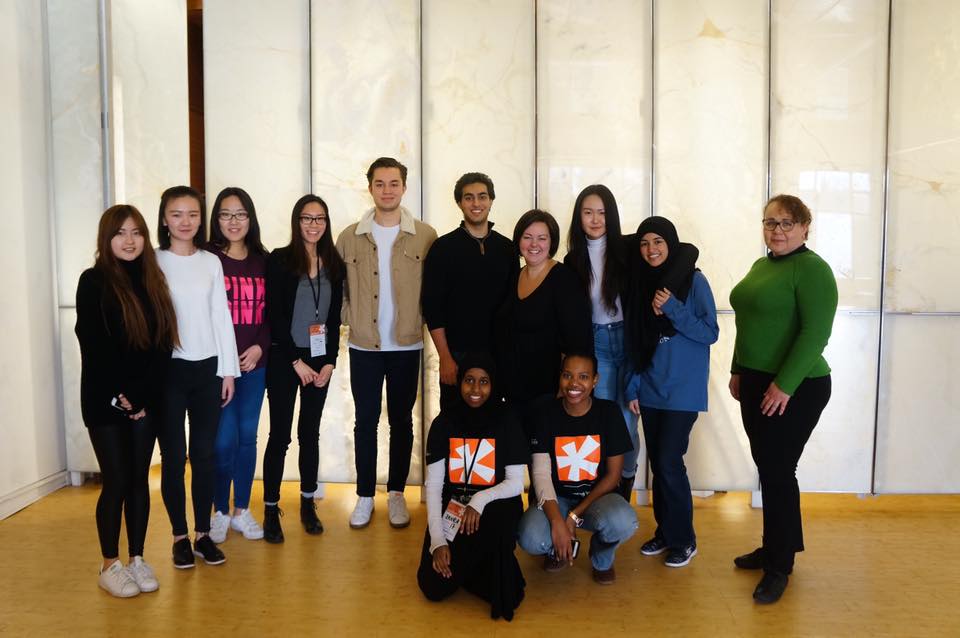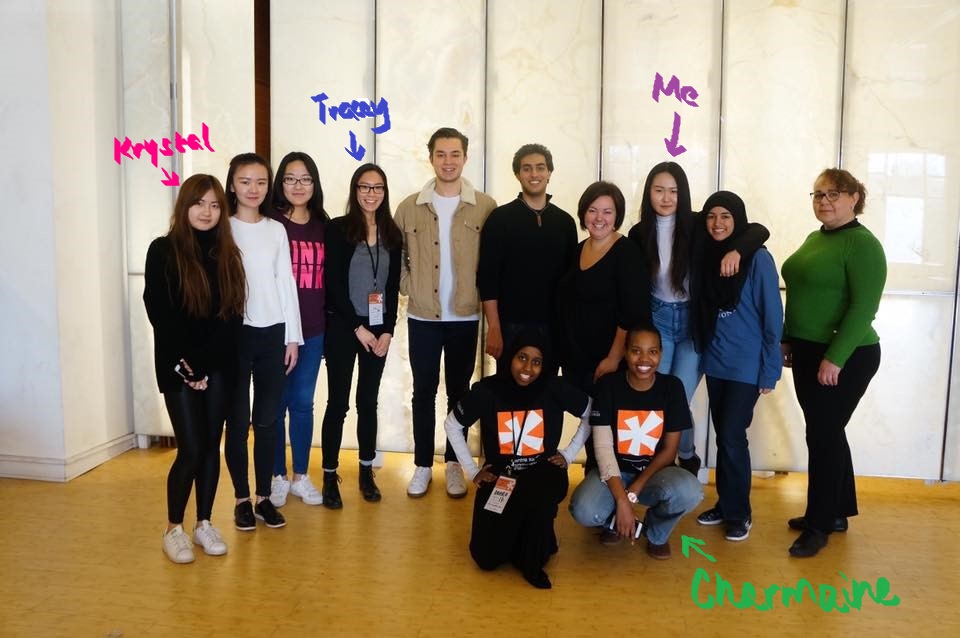Ever wondered if there was an alternative to sitting at home planning to do something prooductive like reading your textbook for the very first time since September but end up just binge watching Netflix anyways or being stuck at a foreign airport on your way to some exotic island to escape the winter in Toronto but end up wasting half the time getting there and back? Well, my friend, you're in luck, because I've got the perfect solution for you and it's called Alternative Reading Week 🙂
On February 20th last year, I started my three-day-journey with a group of amazing people who volunteered their well-deserved reading week break to understand a community better and from that understanding, come up with suggestions to help improve the quality of this community. Our group had a blast working with Innovation Hub to brainstorm ideas about enhancing our student life at U of T and presenting these ideas on the last day of ARW to a supportive audience composed of students and staff.
“We want to make a big difference for a large group of people”.
That, was the line we finished with for our final presentation. In some ways, I think it also speaks to one of Alternative Reading Week (ARW)'s mission. If I had remembered only one thing from the ARW orientation just a few weeks before the actual ARW, it would be: we are not here to change other’s lives or help people in need, instead we are here to understand and learn from the people in our communities. I think Elvis (the coordinator for ARW last year) said something along those lines, don’t take my word for it, but I assure you it was wise. The difference we are making here is largely if not entirely on ourselves, the experience is what we will take away the most from ARW and not some aid you and I have provided or some selfless act you and I did within the three days of ARW. I never thought about volunteering in this way, it was always a thought that because of my altruistic actions the community is better than it was before. I was wrong, in terms of real difference, my contribution would be insignificant compared to the full-time workers in community centers and people who make it their life’s career to helping others. My volunteerism was merely an experience, and that may seem trivial, even superficial. But it isn’t. I know this because ARW helped me arrive at that conclusion. It is truly our experience that really mattered. Only with more experience can we see better, breathe deeper and feel closer to the volunteer work we do. This is why I signed up for ARW, this is why Woodsworth has its own team of passionate student volunteers, this is why Centre for Community Partnerships at UofT runs ARW every year. We learn the most from doing yet we shouldn't take action blindly, we set a clear goal and we strive to make that difference. Sometimes that difference may be within ourselves, sometimes it may be for a whole community, regardless for whom, it should be just as valuable and meaningful. For our innovation hub project, we were split into two groups; each with a theme to tackle on: access for every student and fostering connectedness. I was in the Fostering Connectedness group. We were tasked with the goal to find a solution for an issue related to the theme or take a preexisting idea from the innovation hub ideas bank and improve it. We were then asked to make a final presentation on the last day of ARW. As a group, we decided to transform the idea of a U of T Concierge to what we ultimately called “The Core”. In our precious three-day group discussions, we brainstormed ideas that you can agree are great from just hearing the creative names we came up with such as: the Core, the Portal, a venting machine (vending machines, get it? You better do because I came up with this one), etc. We also had a logo in progress, but that’s not important. The bigger question we faced was: “How does information get to where it should be and to the students that need it?”. The challenge was not providing information but how to integrate it, and relay it. Consequently, how do we create a more efficient “thalamus” at U of T? In the process, we got to discover and learn more about the resources at U of T. We debated on the reasons why even as current students we are so oblivious to these great assets at our disposal, how then would incoming students react, or in this case not react? In the beginning, our project director Julia told us our goal should be to either make a small difference to a large group of people or a big difference to a small group of people, but not both. We decided that we were going to be ambitious, so we wanted to make a big difference for a large group of people. And, I believe we did. Under such constricted time, we were still able to draft up an idea and make it into a smooth and creative presentation. That was totally unexpected but seemingly successful. So yes, I think if we were to get together once again as a group and work out a detailed plan, our brainchild- the Core-may someday be U of T’s core, no pun intended.I figured you would not be fully convinced by just me that participating in Alternative Reading Week is the greatest alternative to getting a ticket to New York or someplace fancy. So here's hoping that these perspectives from my project teammates will persuade you even more and prompt you to go sign up right away:
Tracey: Alternative Reading Week (ARW) was an unforgettable experience that gave me the opportunity to work alongside a fantastic group of individuals. As part of the team that worked with Innovation Hub, I had the chance to build onto their idea of fostering connectedness at UofT, which has the goal of improving communication on campus. This project was especially meaningful because my team and I were able to reflect on our collective experiences at UofT, and to then put our minds together to create a plan on how we could promote a greater sense of community and connectivity on campus. I witnessed the gradual development of our ideas over the span of three days and the eventual blossoming of those ideas into a feasible implementation plan. I had the opportunity to be a part of an environment that was inclusive and encouraging, and to contribute my own ideas to a team that was incredibly enthusiastic about the project. Being able to take part in ARW was truly enriching – especially since I got to work on a project that pertains to my experience at UofT – and I would strongly encourage all students to participate in ARW! (Tracey Lam Project Participant ARW 2017) Charmaine: The innovation hub ARW group project was an eye opening experience. In a world full of rankings and statistics it is easy to lose sight of the few blemishes in plain sight. In reflecting about my experience with the lovely group of 9 students and co-leader i would like to share two learning curves. A healthy team dynamic has proved to be the key ingredient to transitioning from brainstorming to being innovative. That is the first lesson i learnt because our team dynamic was great we managed to be positively productive. The group dynamic we had provided a platform for sharing ideas with people who were listening to understand and not listening to respond. A question mark became more than a keyboard symbol and while building each other we managed to come up with innovative ideas because of our open mindedness. I also learnt that it is ok to not know, it is ok to make mistakes and it is ok to not be perfect. It is the little mistakes which make an experience a human experience because they provide a platform for people to be able to grow. We made a few mistakes, clashed on some ideas and even had different ways to brainstorm but we created something in the end because we were able to let all those experiences build us. The ARW experience is always in some way enriching. Through community engaged learning we were afforded an opportunity to be inquirers about issues in the community and how we can learn with the community, for community development and also learn from the community and our peers. ARW ethos have taught me a valuable life lesson about the essence of being a balanced and reflective learner who seeks to understand how our own ideas and experiences affect the world and people around us. (Charmaine Nyakonda Project Leader ARW 2017)
Krystal: During the Alternative reading week project, I learned a lot of valuable things both from the projects and my teammates. One of my group mate Iris is a passionate girl, she is very helpful and always gave us new ideas when we were preparing for the presentation, I learned how leadership can be amazing from her and I hope she will continue her positive attitude towards difficulties and being energetic so that people around her will feel the energy like me and be inspired! (Yirui Wang Project Participant ARW 2017)
From what Charmaine, Tracey and Krystal have said, as their Woodsworth Team leader I think I can attest to the great values of ARW on behalf of everyone who participated in the Innovation Hub project and say that ARW was truly a great experience that made a difference on all of us.
So before you book your tickets to NYC or make plans with Netflix for February Reading Week, know that there is this awesome alternative that is both productive and free with the bonus of new friends, experience, and possible career goals 🙂
This was my February Reading Week experience, what's yours going to be?


0 comments on “A snapshot of what an Alternative to your next Reading Week could be like!”